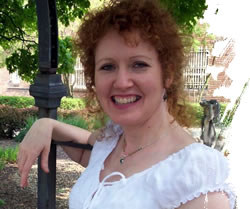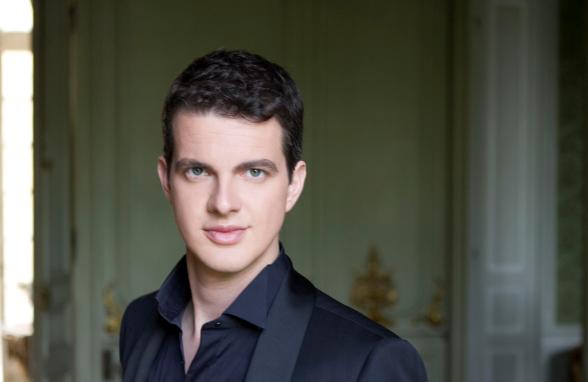Classical Music Review: O Give Me a Muse of Apollo’s Fire!
The audience went wild after each piece Philippe Jaroussky sang. There were three gorgeous encores, ending with the slow, familiar aria from Handel’s Xerxes. Most of the crowd would have been happy to have stayed for more. We knew this was an Apollo’s Fire concert to remember.
By Susan Miron

Apollo's Fire honcho Jeannette Sorrell — she talks about Handel and Vivaldi as if she knew them personally.
There are concerts that stick in one’s memory forever. Apollo’s Fire’s joint concert with the spectacular countertenor Philippe Jaroussky, entitled Handel and Vivaldi Fireworks, will be exactly that for many of those in the standing-room-only crowd at Emmanuel Church on November 5. Who could forget Mr. Jaroussky’s miraculous voice and what he did with that instrument with such uncanny ease and finesse?
This is surely the Age of Countertenors. Just two weeks ago Andreas Scholl gave a great performance of Purcell with the English Concert in Jordan Hall. Countertenors regularly sing at the Metropolitan Opera, and the popularity of the Early Music movement makes virtuoso countertenors (men who sing in the mezzo-soprano range) something audiences almost take for granted, although they were scarcely around concertizing just 20 years ago. (Mr. Jaroussky is now 32 years old).
Apollo’s Fire, the Cleveland Baroque Orchestra, currently on a US and European tour, was founded by Jeannette Sorrell, a graduate of Oberlin, where she concentrated on Early Music. Ms. Sorrel is the heart of this orchestra as well as the conductor, harpsichordist, and spokesperson. She also writes the very good program notes. In a short, pre-concert lecture, she spoke about the evening’s ambitious composers—Handel and Vivaldi—as if she knew them personally.
She made a strong case that Vivaldi’s works as we know them are usually light concertos written (or so they sound) for children with driving rhythm and simple harmonies. But Vivaldi, she stressed, was often more experimental in color and word painting. In fact, Vivaldi wrote 49 operas, most of which have languished in a library in Turin. They are just now getting sung and published, but few have been performed in the States. It is clear she believes that once these operas are heard, we will have an entirely different conception of Vivaldi.
Ms. Sorrel’s founded her ensemble in 1992, and many of its original players are still there. New players generally come from the Early Music program at Oberlin where Ms. Sorrel now teaches. Its lofty aims, according to the program book, is to have “a collection of creative artists who share Sorrel’s passion for the Baroque ideals of rhetoric and emotional communication (Affekt) in music.” A tall bill, but Ms. Sorrell and her ensemble accomplished just that, and audiences and the press are responding to it. They are an ensemble worth hearing.
The program included an allegro from Vivaldi’s Concerto Grosso in D Major, arranged by the indefatigable Ms. Sorrell, as well as Concerto in A minor for Two Violins, Op. 3 by Vivaldi, played with spunk by Olivier Brault and Johanna Novom. There was a lovely Prelude in A major by Handel, played on the harpsichord by its arranger, Jeannette Sorrell, who performed standing up all evening. The pieces featuring the players went very well, including the ever-popular Concerto Gross “La Follia” by Vivaldi (arranged by Ms. Sorrell). Still, good playing aside, it often felt like these were pieces deployed to give the singer a minute to catch his breath. There was no competing with Mr. Jaroussky, who many in the audience had heard and adored last June when he sang the role of King Anfione in Steffani’s Niobe, Regino di Tebe at the Boston Early Music Festival.
Ms. Sorrell actually found Mr. Jarrousky first on YouTube and flipped. He was booked the next three years, but then he heard Apollo’s Fire on YouTube and decided they were a perfect match. Hence this tour. I believe it might be the beginning of, as they say, a beautiful friendship. The vocal fireworks of the evening were taken from seven operas (Handel’s Oreste, Parnasso in Festo, Imeneo, and Ariodante and Vivaldi’s Catone in Utica, Giustino, and Tito Manlio), none of which are familiar repertoire even to opera lovers.
This did not matter once Mr. Jouroussky began to sing. Dressed in black (a black shirt and open collar), the slender singer won the audience over within a few beautifully turned phrases. His voice is unusually expressive, and his use of ornaments, his overall knowledge of the style, was simply perfect. I was reminded of another favorite singer, mezzo-soprano Cecelia Bartoli, who sings Vivaldi in the same fashion—lots of spirit, flawless execution of the most difficult runs and melismas—serving up seemingly effortless delivery of wildly virtuosic music.
The audience went wild after each piece. There were three gorgeous encores, ending with the slow, familiar aria from Handel’s Xerxes. Most of the crowd would have been happy to have stayed for more. We knew this was a concert to remember.
Susan Miron, a harpist, has been a book reviewer for over 20 years for a large variety of literary publications and newspapers. Her fields of expertise were East and Central European, Irish, and Israeli literature. Susan covers classical music for The Arts Fuse and The Boston Musical Intelligencer.
Tagged: Apollo's Fire, Cleveland Baroque Orchestra, Jeannette Sorrell


